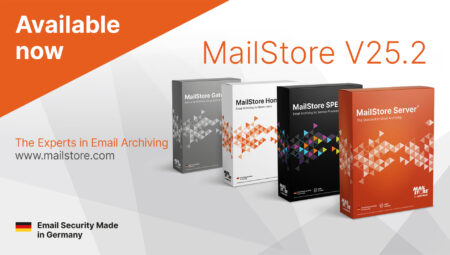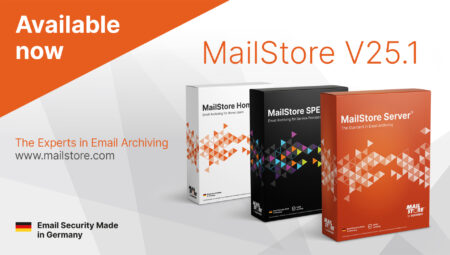
Email Archiving – An Overview for IT Decision-Makers
Why Archive Emails?
A Guide for IT Managers and System Administrators
Not only is email an important means of digital communication, but it is also a comprehensive and valuable information resource for companies. Managing this resource, however, can be a challenge. As a rule, data sent by email are not usually stored at a separate location, but reside in workers’ mailboxes, giving rise to fragmented data silos comprising years of knowledge and expanding on a daily basis. Preserving this knowledge over time so that it can be used efficiently by colleagues can play a crucial role in a company’s success.
This guide is aimed at IT professionals wishing to obtain a general overview of email archiving. In this article, you will learn
- why email archiving should be part of a comprehensive IT strategy,
- how the right software can reduce the burden on your IT department,
- how archiving and backing up data differ, and
- what benefits email archiving can deliver for your business, above and beyond IT.
What is the challenge for email management?
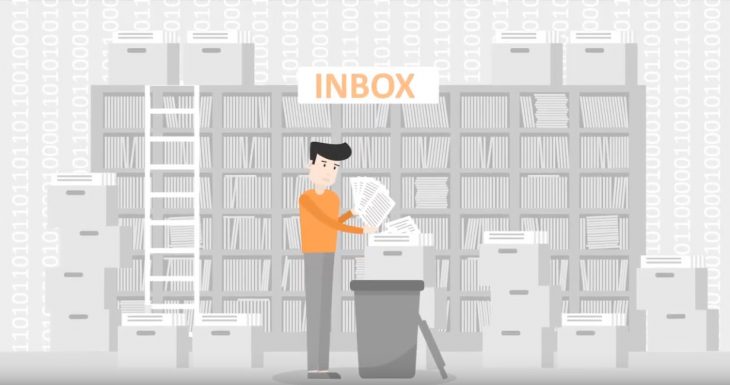
Most companies have excellent email servers or groupware solutions for email communication. But these systems were never designed to store and provide large amounts of data over long periods of time, and this can give rise to technical, legal and financial issues:
- Depending on the country and industry, processing emails and storing this data over time so that it is permanently available can be subject to different legal and regulatory requirements. Often, industries sending and receiving large volumes of sensitive, personal data by email are subject to stricter regulations. These include the healthcare sector and the financial industry, as well as public authorities and educational institutions.
- In the event of a legal dispute (e.g. where emails are being used as evidence) or where data subjects are asserting their rights under the EU’s General Data Protection Regulation (right of erasure/right to access data, right to restrict processing, etc.), a company’s management or legal/compliance team must be in a position to search for and retrieve data from its entire email stock efficiently at all times.
- In order to put this communication resource to effective, productive use, users must be able to access all their emails easily and quickly at all times. Usually, only a professional email archiving solution can address this need. The self-service aspect (users can run archive searches themselves to retrieve individual emails) significantly reduces the workload on an IT department (especially the service desk), but it is not available in every archiving solution.
Due to the increase in email traffic and the tighter regulations seen in many markets in recent years (e.g. the GDPR in the EU and the CCPA in California), we would advise all IT decision-makers to address the issue of email archiving proactively. The option of archiving relevant emails professionally as the cornerstone of a comprehensive email management concept should be a part of every IT strategy. Without an archiving solution in place, email governance policies issued by a company’s management will be difficult, if not impossible, for the IT department to implement on its systems. Such directives could include retention policies for specific emails, centralized archiving of distributed emails (e.g. local PST files, emails that exist solely on email clients), and the ability to restore historic emails.
How Does Email Archiving Work?
An email archive supplements an existing email system (which can, of course, continue to be used as before). The administrator configures which emails are to be transferred to the archive and when, and whether the emails, once archived, should be deleted from the mailboxes on the email server. Ideally, the archive will be able to manage very large volumes of data efficiently.
Our product, MailStore Server, also provides users with direct access to the archive. Users can browse through their emails, including file attachments, and restore this data from the archive without the assistance of IT staff, aided by a fast and powerful full-text search function. Thus, all users in the company are given a speedy and convenient means of accessing their archived emails.
What Does That Mean for the IT Department of an SMB?
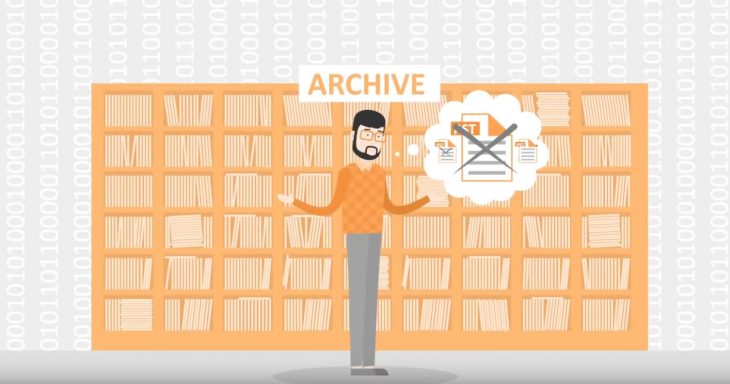
IT decision-makers are coming under increasing pressure due to the burgeoning tide of data. The time and resources needed to guarantee that such data remain secure, retrievable and permanently available are increasing all the time.
Email archiving can help significantly reduce this pressure:
- The option of deleting emails from the server the moment they are archived helps cut storage requirements, not to mention the workload on the email server and the associated running costs.
- The risk of irretrievably losing emails is minimized. Even regular backups of the email server (e.g. using incremental backups) cannot eliminate this risk entirely. Important: archives should always be backed up as well!
- Mailbox quotas become obsolete since emails can be deleted from the server the moment they are archived, meaning that the data volume on the email server can be kept at a constantly low level.
- Archiving reduces the complexity of the backup and restore process. Keeping data volumes on the email server low means that the backup process is quicker and requires less storage – and, in case you need a disaster recovery, you’ll be able to restore your mail server from the backup volumes much faster.
- Administrators can consolidate emails stored decentrally and archive simply. This helps avoid problems caused by PST files and emails being distributed across local user systems.
- And if you’re managing your emails via a public cloud provider or IT service provider, deploying a separate email archiving solution will give you independence. If the email service fails (or if you need to migrate after changing providers), it will be much less of a challenge for the IT team to get the system up and running again.
If the archiving tool provides a self-service search and retrieval function, your IT department will no longer have to invest time and effort in restoring emails from old backups. The average user can access his archive at will without assistance.
We Already Have a Backup Solution – Why Do We Need Archiving As Well?

“We already back up the data on our email servers. There’s no need to archive the data separately”. IT managers who subscribe to this premise are taking a considerable risk, because backups are no substitute for a professional email archive.
Although backups and archiving are both key elements of any safety-conscious business, they pursue different objectives (see table below):
- The primary purpose of a backup is to support the Disaster Recovery (DR) process within the framework of a Business Continuity (BC) concept. Backups protect important data (ideally, including the email archive itself) usually over short or medium time frames so that this information can be restored as required. This guarantees that business-critical systems and data remain available even in an emergency (e.g. system failure or a ransomware attack).
- The aim of archiving, however, is to store emails for many years in a form that is faithful to the original, easy to find, and permanently available. This forms the basis for a professional information management strategy that takes all legal and regulatory requirements into account. Therefore, in addition to backups, email archiving is one of the most important instruments underpinning a company’s Business Continuity (BC) policy.
| Objectives | Email Backups | Email Archiving |
| Eliminate mailbox quotas | ||
| Eliminate PST files | ||
| Reduce storage requirements through de-duplication and compression | ||
| Reduce the workload of email servers and simplify backup and restore processes | ||
| Provide complete, tamper-proof and long-term email retention | ||
| Helps to meet compliance requirements | ||
| Assistance with eDiscovery scenarios | ||
| Full-text indexing of emails for fast searches | ||
| End users: restore lost emails quickly and easily |
The ratings in this table are based on the fundamental concepts of backups and email archiving. The functions of an email archiving solution discussed here are based on the range of functions provided by MailStore Server. The functions of backup and email archiving solutions may vary, depending on the vendor.
Does Email Archiving Help to Meet the Requirements of the EU’s GDPR?
The European Union’s General Data Protection Regulation (GDPR) harmonizes data privacy laws in Europe, placing an emphasis on the protection of personal data. In different areas, therefore, companies must ensure that personal data is handled in a manner that complies with the terms of the GDPR. Breaches can attract fines of up to EUR 20 million or 4 percent of a company’s total global turnover of the preceding financial year, whichever is higher.
Complying with the data privacy rules set down in the GDPR is a corporate-wide challenge involving numerous processes and procedures. Email archiving tools can help businesses meet several core requirements of the EU regulation. Even companies outside the EU would be well advised to familiarize themselves with the GDPR if they intend to process the personal data of EU citizens during everyday business.
Our own software, MailStore Server, can help you comply with the following GDPR articles, for example:
- Right of access (Art. 15 GDPR): The powerful search function in our archiving solution allows emails and file attachments concerning e.g. a specific customer or employee to be located and exported quickly. Companies are in a position to provide third parties with information, whenever required.
- Right to erasure (Art. 17 GDPR): Documents containing personal data may also need to be stored in an audit-proof manner, i.e. protected against erasure and manipulation during statutory or regulatory retention periods. MailStore Server boasts functions that support deletion/retention management and allow you to comply with GDPR requirements.
- Right to data portability (Art. 20 GDPR): Natural persons are entitled to request the disclosure of any personal data concerning them and have it provided in a structured, commonly used and machine-readable format, and to have this data transferred to another “controller”. MailStore Server complies with the right to data portability by providing an export function that supports all common email formats (EML, MSG, PST).
- Right to object (Art. 21 GDPR): The GDPR stipulates that if a company wishes to process personal data, it must demonstrate that it has obtained the data subject’s consent to do so. The data subject must also be able to withdraw that consent. As MailStore Server is an email archiving tool, consent and the withdrawal thereof expressed by email are captured in an upstream system (e.g. an online shop, email marketing system, etc.). Resulting transaction mails – for example opt-ins of email marketing or lead management systems – are copied to the email archive.
Orderliness and transparency in handling personal data are key requirements when it comes to complying with the GDPR – from the collection and storage/accessing of the data, up to the point when the data is deleted. Deploying powerful email archiving software is, therefore, an important step on the path to GDPR conformity.
What are the Benefits of Email Archiving for Businesses Beyond IT?
As already mentioned, email archiving is a key element of a company’s IT strategy and information management policy. Nevertheless, it can be difficult to convince departments and decision-makers outside IT of the advantages of implementing new software – even though, as shown below, email archiving can deliver benefits in all areas of a company.
Safeguard against data loss
It is always possible for employees to delete important emails – whether by accident, out of ignorance, or even with malicious intent. Scenarios in which a user deletes the entire contents of a mailbox on leaving the company are particularly serious. Around the globe, critical data are lost in this way every day. With the aid of an email archiving solution, however, all existing and future inbound and outbound email traffic can be fully archived, allowing emails to be archived before they even reach the user and data loss avoided.
Helps with email compliance
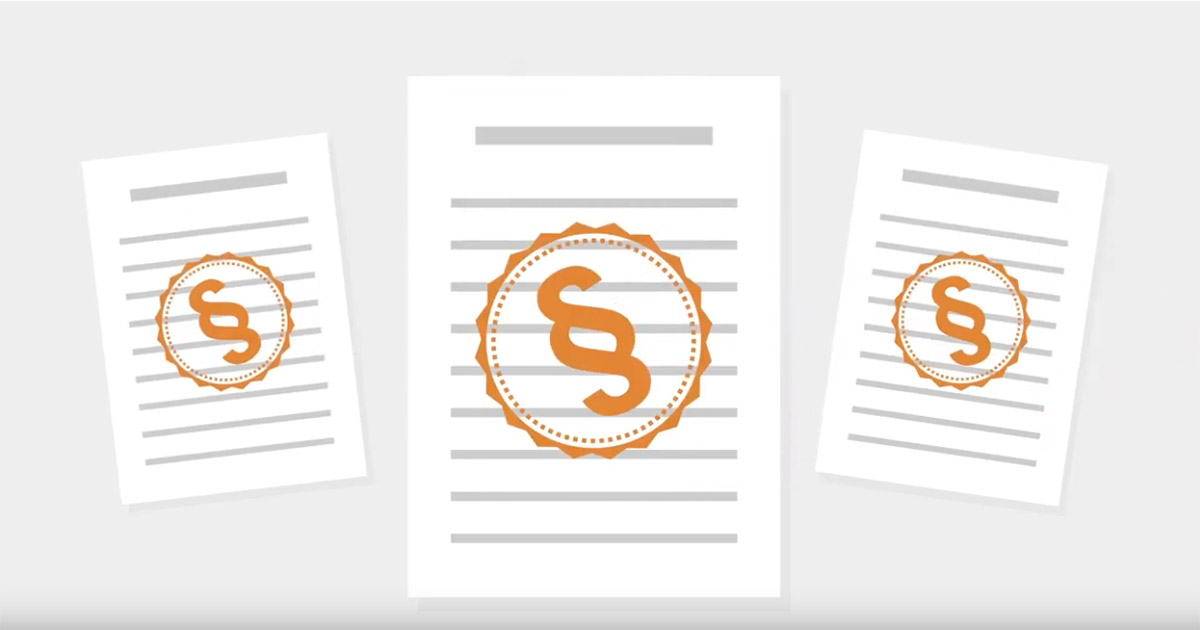
Email archiving can support compliance with statutory and regulatory requirements, the responsibility for which usually lies with the company’s management. A breach of archiving duties can result in fiscal penalties and, in some cases, even litigation under civil law.
For most companies, therefore, it makes sense to archive all relevant emails and file attachments completely and in a form that is tamper-proof and permanently available and retrievable. Email archiving can deal with this task effectively, while also facilitating the use of emails as evidence in a court of law. The EU eIDAS regulation has reinforced the probative value of electronic documents in the European judicial region. In the USA, it is not uncommon for emails to be used as evidence in court. Here, they often form the basis of complex eDiscovery proceedings in which reams of corporate emails are trawled through in order to locate and preserve a specific item of information. Therefore, a company should be in a position to run a search through its entire email stock in the case of a discovery scenario and have the data exported in a standard format, where necessary.
An anecdote told by the IT manager of one of our customers is testament to the value of email archiving in this context: “My former employer was involved in a legal dispute and didn’t have an email archiving solution. Much of the evidence centered on emails written by a dozen employees or so. I spent almost six months of my life collecting, indexing and checking PST files. It was an unpleasant experience and I swore it would never happen again.”
Reduce IT cost and effort
Email archiving enables a business to cut the email management costs incurred by the company’s IT department. Storage requirements can often be reduced significantly by swapping out emails from the mail servers. At the same time, the IT department is spared the laborious task of restoring specific emails from backups or email servers in response to a user request. IT experts can invest the freed-up capacity in more important projects.
Gain independence from software vendors and service providers
A critical aspect when backing up email servers is the time lag before data can be restored following a loss event. In the worst case, the company will not be able to access business-critical information contained in emails for several hours or even days. An archive can solve this problem entirely for business-critical emails. If your email server fails or data is lost, all archived emails will ideally remain available for search and recovery operations. Business activity continues without interruption.
Rather than storing emails on-premises (i.e. under the direct control of your IT department), many companies opt to use the external servers of a public cloud provider (e.g. Microsoft 365 or Google Workspace), or a managed service provider. This calls for a degree of trust in the technical backup mechanisms in place – and in the permanent availability of these services.
IT decision-makers should also be aware that, as a rule, the major public cloud providers, in particular, only guarantee the availability of their own infrastructures – i.e. responsibility for protecting and preserving customer data lies with the client. This also applies to backups and archiving. Archiving this data outside the provider’s systems is a simple, additional safety measure.
What’s more, users of MailStore Server also remain independent from us, the vendor of the archiving solution! Thus, emails can be exported from the archive at any time in a standardized format.
Tip for further reading – White Paper: Archiving Emails in Microsoft 365
While Microsoft 365 is a powerful platform, SMBs should take good care to preserve and keep their emails available. This free white paper from market research firm Osterman Research provides you with a thorough overview of the email archiving options for SMBs that are using Microsoft 365.
Increase user productivity in everyday business

Ensuring that emails, as a critical information resource, are available quickly and comprehensively can help increase a company’s productivity. In MailStore Server, for example, the self-service function provides users with various means of accessing an archive (e.g. through integration in Microsoft Outlook or via platform-independent Web Access), while a fast full-text search function allows emails to be located and then restored. In the meantime, your IT service desk is free to get on with more important tasks.
In addition, the deployment of an archiving tool renders mailbox quotas superfluous. Instead of investing precious time in organizing mailboxes or weeding out insignificant emails, users can access their emails at any time (with Web Access, even while on the move).
Fast ROI
Using an archiving solution for emails reduces the workload on the IT department and can significantly cut storage costs. As a rule, the solution will pay for itself within a short period of time. Companies are also able to mitigate their exposure to financial risks stemming from data loss or legal disputes.
Check List: How to Find the Right Email Archiving Solution
Whether raised by the management or corporate data privacy or compliance officers, different interests are sure to emerge when it comes to choosing email archiving software. It’s important, therefore, to consider several important criteria when looking for an appropriate tool.
- Flexible storage management: Choosing an archiving software that uses methods such as de-duplication and compression can help reduce storage requirements by as much as 70 percent. Flexible storage management also means that fast, expensive storage media can be reserved for current emails; a good system will always transfer older, less frequently accessed emails to slower, cheaper storage.
- Easy to install and maintain: A simple installation makes it easier to set up the software, while an intuitive usability enables the archiving to be set up quickly. If all the necessary components, such as database systems, are already integrated, this saves additional time, reduces costs and administrative effort.
- Archiving existing emails: When you roll out the new software in your company, it should be no problem to archive current emails stored in individual mailboxes, public folders, and shared mailboxes and emails files.
- User friendly: Users should be able to access their archived emails as usual via Microsoft Outlook, browser, or while on the road with a tablet or smartphone.
- Self-service for the user: Not all archiving solutions allow staff to access email volumes by themselves. But the workload on an IT department can be reduced significantly if the new solution allows users to work productively within the archive.
- Certification: For many companies, it’s important that the software permits GDPR-compliant working standards and, where required, boasts appropriate certification.
- Flexibility: The archiving software should support all conventional email systems and archiving methods. Ideally, it should also be possible to realize customized application scenarios via an integrated API.
- Fit for purpose: Your archiving tool must be a good fit for the size and requirements of your business. For example, it is rarely the case that an SME will need a large enterprise solution, rather software that is tailored to the small or mid-sized company in terms of functional scope and total cost of ownership (TCO).
You need an email archiving solution that addresses all the needs of your organization – from the management and the IT department all the way to the end user. It’s a good idea to put together a list of requirements setting out all the legal, financial and technical criteria that need to be met.
Free PDF Download
Download our free guide “Email Archiving – an Overview for IT Decision-Makers” with all the contents of this article as a PDF now.
Tips for Further Reading
On our website, you will find many other blog articles including white papers and guides that can help you gain a better understanding of email archiving. Here’s a small selection:
- In her blog post “Make the email archive available to staff working from home” Rebecca Rommelrath explains how MailStore Server lets you make an email archive available to staff working remotely.
- Our guide “Email archiving and the EU General Data Protection Regulation” explains the role played by email archiving in helping you to comply with the EU’s GDPR.
- In its white paper “The benefits of third-party email archiving for businesses using Office 365”, the market research institute Osterman Research explains how small and mid-sized enterprises can adequately protect business-critical email. In the white paper, experts compare the native archiving functions available in Microsoft 365 with those offered by third-party solutions.
- In her blog article “Email archiving vs. backups – the critical differences”, Larissa Wiegand examines the key differences between backups and email archiving.
- Finally, our three-part MailStore Server product video showcases the strengths of our own product, MailStore Server.



